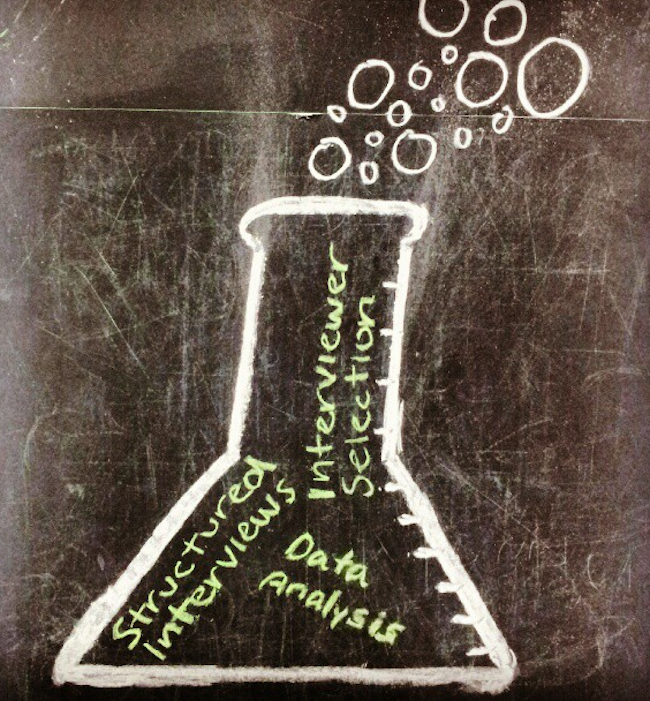Recruiting – like most things – is both an art and a science. By focusing on the “science” of recruiting, hiring departments can consistently and methodically improve the way they operate.
A scientific recruiting process needs an organized interview process. First, the interview process should be repeatable and measurable. Secondly, interviews should be consistently executed by the most-qualified interviewers. Finally, data should be analyzed and adjustments made where necessary. We have spoken with dozens of hiring teams, and here are the top three behaviors we’ve seen that help in running an organized interview process.

1. Structured interviews
Most hiring teams we’ve met allow interviewers to conduct interviews however they want. This “improvisational” approach is easy and feels natural, but unfortunately is not repeatable, not sufficiently measurable, and does not contribute to an organized interview process. Instead, we advocate the use of structured interviews, where questions are selected in advance, and interviewers are assigned specific questions and skill areas to cover. Executed properly, structured interviews allow you to get a consistent interview result using any qualified interviewer.
Here’s how it works in practice. First, the skills and characteristics new employees will need to be successful are identified. Next, interview questions that do a good job of exposing those skills and characteristics are prepared, the interview questions are organized into individual interviews, and interviewer documentation such as question and feedback forms are prepared. Finally, when conducting interviews, interviewers follow the documentation, and grade candidate responses using the prepared materials.
The end result is an interview that is repeatable, highly measurable, and easy to conduct. For more information on structured interviewing, we recommend Behavioral Interviewing Guide by Tom Turner, and Who by Geoff Smart and Randy Street.
2. Interviewer Selection
Without a process, it’s common for recruiters to select interviewers based on their calendar availability as opposed to their skill in conducting interviews. Even worse, recruiters are prone to selecting “easy” interviewers to help them fill a position as quickly as possible.
To avoid these problems and ensure your interview process is scientific, we suggest using a tool to track and assign interviewing activity. An easy option is to just keep a spreadsheet with each interviewers’ skill set (or tag the person’s skill set within your recruiting software) and how many interviews they perform over time. When scheduling an interview, simply refer to the spreadsheet to match interviewers and interviews according to skill set, and use the interview history information to make sure the team is being rotated effectively (regardless of calendar availability).
The goal is to easily track interviewer skills and workload, select appropriate interviewers when scheduling interviews, and ensure that interviewers are rotated properly.
3. Data Analysis
Once a process is in place for using structured interviews, assigning appropriate interviewers, and tracking results, we can complete the loop by analyzing the data and using the results to refine the hiring process.
We see many companies perform this analysis by looking at how well their common interview questions and interviewers predict the outcome of the hiring decision. While this feels smart, it really just encourages groupthink in your hiring decision making process. It may make your hiring process faster, but it probably won’t make it better.
To properly tune your hiring process, we recommend following candidates for at least two years after the hiring decision (both hires and no-hires), and incorporating their long-term performance data into your analysis. This long-term analysis will help you identify which common interview questions and interviewers truly predict great on-the-job performance.
These three behaviors – using structured interviews, effective interviewer selection, and long- term data analysis – form the foundation of an organized interview process, and we encourage forward-thinking recruiting teams to use them for effective hiring.
Jonathan Kennell and Sandeep Jain are the co-founders of 212 Labs, which is a New York- based startup focused on improving the hiring process through technology.
